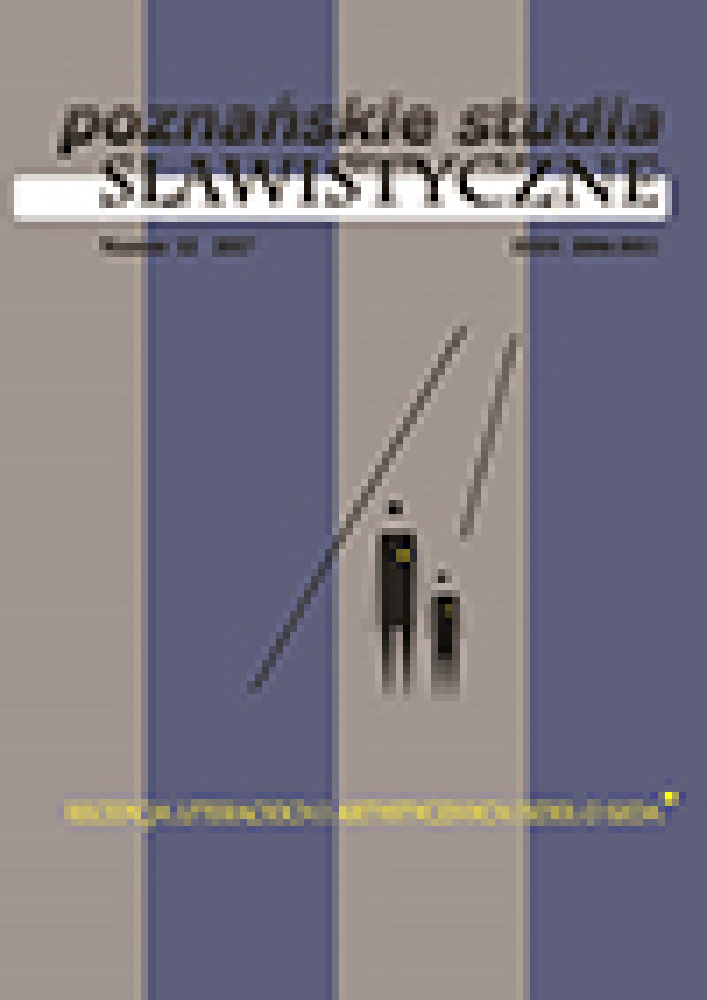Abstract
This paper is the analysis of Götz and Meyer (Gec i Majer, 1998) by David Albahari (b. 1948), the writer of Serbian and Jewish origin. His novel belongs to the Holocaust-literature and its metanarrative structure calls into question the problem of transferring radical historic moment into fiction. The article focuses on the interrelations between fiction and fact, imagination and history, as well as the traumatic experience recognized as the opportunity to identify with the experience of Holocaust victims. Albahariʼs novel proves that remembering of dramatic events from the past can be activated both by imagination and traumatic experience.References
Albahari D., 2007, Götz i Meyer, przeł. M. Duškov, Toruń.
Albahari D., 2012, David Albahari, Beograd.
Bukwalt M., 2014, My prawda grobów i my złuda istnienia. Obraz zagłady Żydów serbskich w powieści „Gőtz i Meyer” Davida Albahariego, „Południowosłowiań- skie Zeszyty Naukowe” nr 11, s. 63–77.
Debeljak A., 2014, Balkansko brvno. Eseji o književnosti „jugoslavenske Atlantide”, przeł. J. Pogačnik, Zagreb.
DeKoven Ezrahi S., 2014, Holokaust a zmieniające się granice sztuki i historii, w: Reprezentacje Holokaustu, wyb. i oprac. J. Jarniewicz, M. Szuster, przeł. M. Michalski, Kraków–Warszawa, s. 163–182.
Felman S., 2014, Nauczanie i kryzys albo meandry edukacji, w: Reprezentacje Holokaustu, wyb. i oprac. J. Jarniewicz, M. Szuster, przeł. M. Lachman, Kraków–Warszawa, s. 343–400.
Giergiel S., 2007, Czy ja to mój bohater? Davida Albahariego gra rolami narracyjnymi, „Pamiętnik Słowiański” z. I, s. 35–54.
Giergiel S., 2012, Ocalić pamięcią. Praktyki pamięci i zapominania we współczesnej prozie postjugosłowiańskiej, Opole, s. 69–122.
Kornhauser J., 2009, Serbska literatura emigracyjna po 1991 roku. Przypadek Davida Albahariego, w: Słowiańskie diaspory. Studia o literaturze emigracyjnej, red. C. Juda, Kraków, s. 133–147.
Llosa M.V.,1999, Prawda kłamstw. Eseje o literaturze, przeł. D. Walasek-Elbanowska, Poznań, s. 5–18.
Mitrović M., 2005, „Gec i Majer” or Situational Education, „Serbian Studies: Journal of the North American Society for Serbian Studies” nr 1, s. 83–93.
Nowak-Bajcar S., 2010, Mapy czasu: serbska proza postmodernistyczna wobec wyzwań epoki, Kraków, s. 91–123.
Nycz R., 2012, Poetyka doświadczenia. Teoria – nowoczesność – literatura, Warszawa.
Ognjenović V., 2007, Cervantesova djeca (zbirka intervjua), Pula, s. 12–17.
License
Copyright (c) 2017 Urszula Putyńska

This work is licensed under a Creative Commons Attribution-NoDerivatives 4.0 International License.
